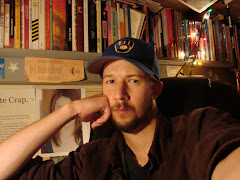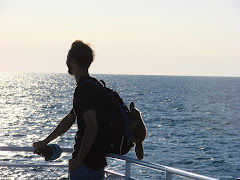Friday, August 15, 2008
Monday, August 11, 2008
Ursula Le Guin is brilliant
Recently I finished Ursula K. Le Guin's The Dispossessed, a science fiction novel published in 1974 that transcends any one genre and incorporates ideas and emotions from across the human spectrum.
It is a great work and a great read.
The story follows the life of one Shevek, a man who is an outcast among outcasts, an intuitively brilliant physicist of Einsteinian proportions, with a social conscience, who emerges within a self-exiled society of 20 million anarchists who inhabit one of the twin worlds of Alpha Centauri. These anarchists have developed a"nonauthoritarian communist" form of government--they do not call it such--where their ideal goal is honest, joyful work and service to the "social organism." They proclaim no property and their language lacks possessive pronouns. Sex and learning and laboring and family are eerily distant from and yet resonant with our own experiences. For after all, human beings are human beings.
Political and life events bring Shevek in a journey to the sister planet, one filled with "propetarians" and where everything is bought and sold. While his home planet is barren and dry, however, the twin planet is Earthlike, watery and bounteous and laden with culture and technology and pride but also political strife and gender and class inequality. Shevek journeys to the nation state analogous to the United States because the government there wants to develop dominating technology from the fruits of his research. He encounters culture shock and learns the many layers of this society strange to him, even as he reflects back upon the events and choices and changes that have determined his own life path. While there is a sort of plot of geopolitical intrigue, this remains background radiation: the focus remains on the man and his struggles within to be who he is.
Le Guin brings Shevek's past and his present into an elegant braid that reveals more and more as we read on, with pages packed with philosophical discussion couched within dramatic problems, physical and metaphysical speculation and cutting satire and culture commentary balanced with sex, soulful and painful journeys, and the poetics of human relationships defined as much by absence as by presence.
There is much to praise about this book, which I purchased at a rummage years ago but which sat on my bookshelves for too many years before I simply picked it up to read and could hardly set down over the past week.
There is a sense in which one has to be ready to appreciate this book, however, as I don't know that I could have read this even four or six years ago and both understood and appreciated it. I would have understood it--but not appreciated it the way I do at this moment in life.
While she does not need my commentary to legitimize the success of her work, I make this small mark to call attention to Le Guin's creation.
It is a great work and a great read.
The story follows the life of one Shevek, a man who is an outcast among outcasts, an intuitively brilliant physicist of Einsteinian proportions, with a social conscience, who emerges within a self-exiled society of 20 million anarchists who inhabit one of the twin worlds of Alpha Centauri. These anarchists have developed a"nonauthoritarian communist" form of government--they do not call it such--where their ideal goal is honest, joyful work and service to the "social organism." They proclaim no property and their language lacks possessive pronouns. Sex and learning and laboring and family are eerily distant from and yet resonant with our own experiences. For after all, human beings are human beings.
Political and life events bring Shevek in a journey to the sister planet, one filled with "propetarians" and where everything is bought and sold. While his home planet is barren and dry, however, the twin planet is Earthlike, watery and bounteous and laden with culture and technology and pride but also political strife and gender and class inequality. Shevek journeys to the nation state analogous to the United States because the government there wants to develop dominating technology from the fruits of his research. He encounters culture shock and learns the many layers of this society strange to him, even as he reflects back upon the events and choices and changes that have determined his own life path. While there is a sort of plot of geopolitical intrigue, this remains background radiation: the focus remains on the man and his struggles within to be who he is.
Le Guin brings Shevek's past and his present into an elegant braid that reveals more and more as we read on, with pages packed with philosophical discussion couched within dramatic problems, physical and metaphysical speculation and cutting satire and culture commentary balanced with sex, soulful and painful journeys, and the poetics of human relationships defined as much by absence as by presence.
There is much to praise about this book, which I purchased at a rummage years ago but which sat on my bookshelves for too many years before I simply picked it up to read and could hardly set down over the past week.
There is a sense in which one has to be ready to appreciate this book, however, as I don't know that I could have read this even four or six years ago and both understood and appreciated it. I would have understood it--but not appreciated it the way I do at this moment in life.
While she does not need my commentary to legitimize the success of her work, I make this small mark to call attention to Le Guin's creation.
Subscribe to:
Posts (Atom)


